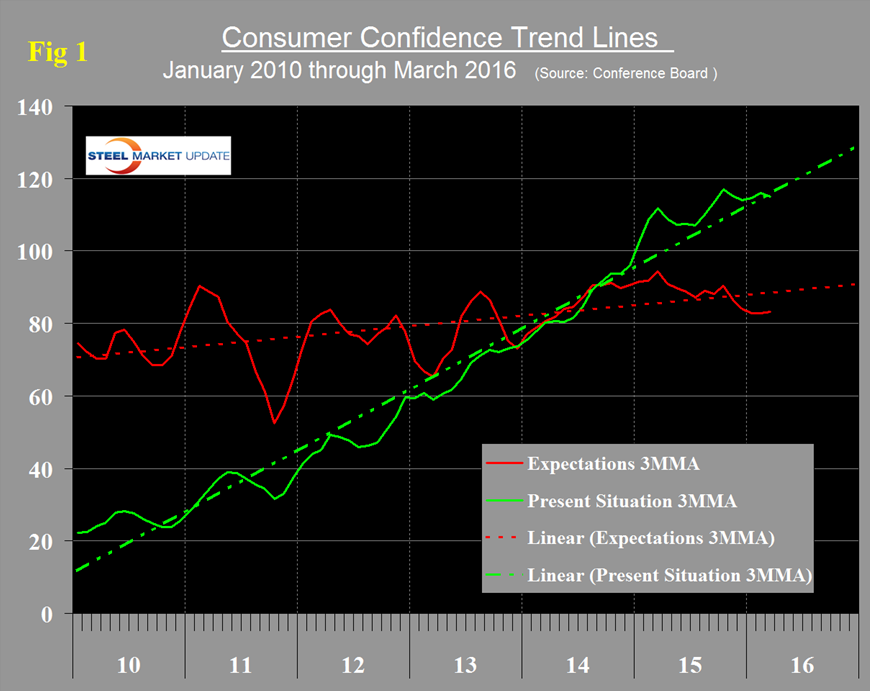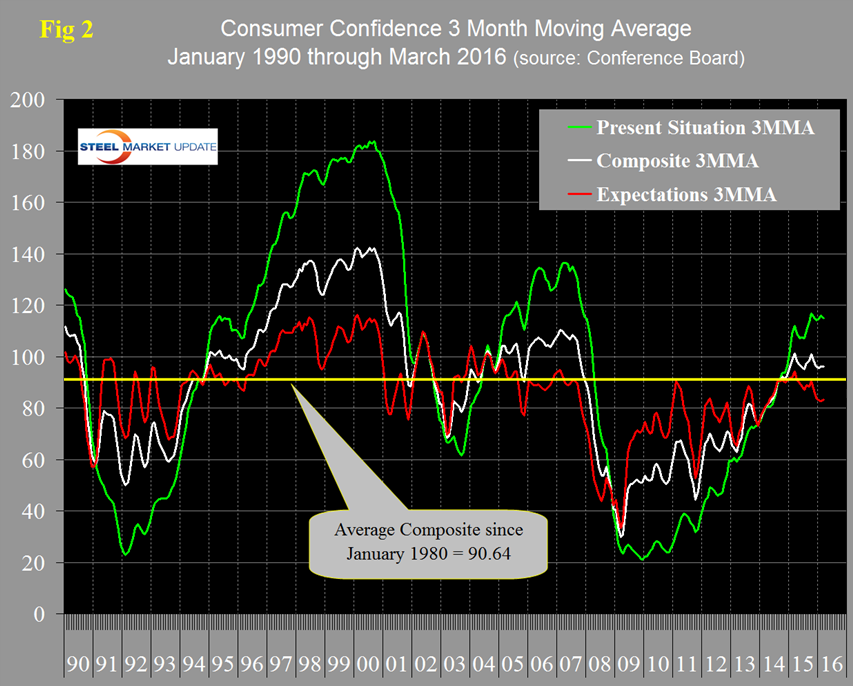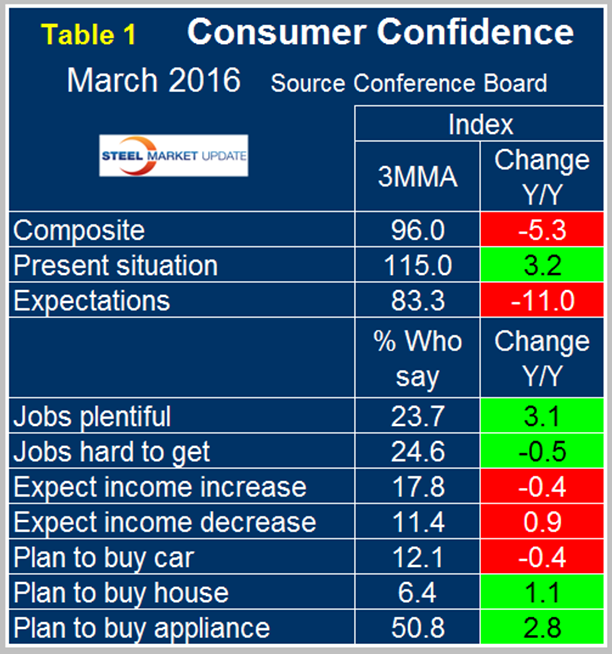Market Data

March 31, 2016
March 2016 Consumer Confidence
Written by Peter Wright
Consumer Confidence rose from an upwardly revised 94.0 in February to 96.2 in March. Included below is the official news release from the Conference Board. Our SMU analysis is exactly the opposite from the official version. This is not to say who is right and who is not but to point out to our members that we should sometimes (or usually) look behind the headline single month numbers. The three month moving average (3MMA) declined very slightly from 96.03 in February to 96.00 in March. We prefer to smooth the data in this way because of monthly volatility which in the case of consumer confidence has been quite extreme since the beginning of last year. The 3MMA of the present situation is exactly on its six year trend and that of expectations has been below its six year trend for the last six months (Figure 1).
The historical pattern of the 3MMA of the composite, the view of the present situation and expectations are shown in Figure 2.
The progression of the composite was positive throughout 2014 but the value in March 2016 was exactly the same as on January 2015 on a 3MMA basis. In other words this indicator has gone nowhere in over a year. Since January last year the improvement in the present situation has been exactly countered by the deterioration in consumer expectations. Comparing March 2016 with March 2015 (y/y) the composite was down by 5.3, the present situation was up by 3.2 and expectations were down by 11.0 (Table 1).
Comparing Table 1 with the same format that we published last month, every item except the last two deteriorated month over month. Year over year the job availability sub-indexes improved but wage expectations deteriorated for the third straight month. The year over year trend for auto purchase intentions was negative for the eighth straight month. We don’t know what the lead of this component is compared to actual purchases but it doesn’t seem to jive with the exceptional sales result of 2016. Plans to buy a house have been positive for ten straight months and plans to buy an appliance remained positive for the third straight month.
The official news release from the Conference Board reads as follows and is entirely based on monthly changes. This is a highly regarded indicator which we believe needs to be examined in a longer time context to get the real picture.
The Conference Board Consumer Confidence Index Improved in March
NEW YORK, March 29, 2016 /PRNewswire/ — The Conference Board Consumer Confidence Index, which had decreased in February, improved in March. The Index now stands at 96.2 (1985=100), up from 94.0 in February. The Present Situation Index declined moderately from 115.0 to 113.5, while the Expectations Index increased from 79.9 to 84.7 in March.
The monthly Consumer Confidence Survey, based on a probability-design random sample, is conducted for The Conference Board by Nielsen, a leading global provider of information and analytics around what consumers buy and watch. The cutoff date for the preliminary results was March 17.
“Consumer confidence increased in March, after declining in February,” said Lynn Franco, Director of Economic Indicators at The Conference Board. “Consumers’ assessment of current conditions posted a moderate decline, while expectations regarding the short-term turned more favorable as last month’s turmoil in the financial markets appears to have abated. On balance, consumers do not foresee the economy gaining any significant momentum in the near-term, nor do they see it worsening.”
Consumers’ appraisal of current conditions eased in March. Those saying business conditions were “good” decreased from 26.5 percent to 24.9 percent. However, those saying business conditions are “bad” edged down from 19.0 percent to 18.8 percent. Consumers’ appraisal of the labor market was mixed. Those claiming jobs are “plentiful” increased from 22.8 percent to 25.4 percent, while those claiming jobs are “hard to get” also rose to 26.6 percent from 23.6 percent.
Consumers were more optimistic about the short-term outlook than in February. The percentage of consumers expecting business conditions to improve over the next six months increased moderately from 14.5 percent to 15.0 percent, while those expecting business conditions to worsen decreased from 11.6 percent to 9.2 percent.
Consumers’ outlook for the labor market was also more favorable. Those anticipating more jobs in the months ahead increased slightly from 12.2 percent to 12.9 percent, while those anticipating fewer jobs decreased from 17.7 percent to 16.3 percent. The proportion of consumers expecting their incomes to increase declined moderately from 17.7 percent to 17.2 percent, while the proportion expecting a reduction in income edged up from 11.6 percent to 11.8 percent.
About The Conference Board
The Conference Board is a global, independent business membership and research association working in the public interest. Our mission is unique: To provide the world’s leading organizations with the practical knowledge they need to improve their performance and better serve society. The monthly Consumer Confidence Survey®, based on a probability-design random sample, is conducted for The Conference Board by Nielsen, a leading global provider of information and analytics around what consumers buy and watch. The index is based on 1985 = 100. The composite value of consumer confidence combines the view of the present situation and of expectations for the next six months. The Conference Board is a non-advocacy, not-for-profit entity holding 501 (c) (3) tax-exempt status in the United States. www.conference-board.org.
Sources: The Conference Board and SMU Analysis










